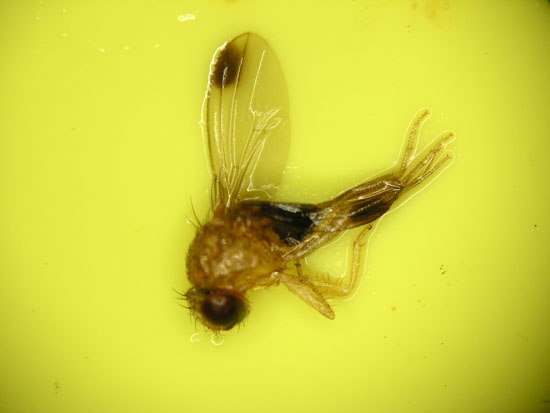Social media saves on insecticides
Social media saves on insecticides

A University of Kentucky entomologist is using a social media platform to help producers cut down on unnecessary insecticide applications.
Ric Bessin started the Facebook page Swdinky to help growers monitor and potentially treat for the spotted wing drosophila, a fruit fly that can destroy soft-skinned, small fruit including grapes, raspberries, blueberries, blackberries and strawberries. The invasive insect first appeared in Kentucky in 2012. It overwinters in the state, but when it becomes active varies by year.
Bessin recruited growers to volunteer to trap the insect during the growing season. Volunteers reported their findings to their county extension agent. The agent in turn reported the information to Bessin who posted it on the Facebook page.
“It’s easy to use Facebook to report the results of the trapping, because everyone can see the information at the same time, and I don’t have to send out individual emails,” said Bessin, extension professor in the UK College of Agriculture, Food and Environment.
While the page is up year round, it becomes active beginning in April and May, when Bessin announces the trapping locations for the year. Trap counts come in as early as May and continue throughout the growing season.
Knowing when and where the pest is can help growers save time and money on unnecessary insecticide applications. Thus far, the insect has appeared after most producers have harvested their early summer crops like strawberries.
“If they didn’t have this information, growers would be preventively spraying either a conventional or organic insecticide every five to seven days during the harvest to save their crop from this pest,” Bessin said. “We have eliminated a lot of the spraying for this insect, because through monitoring, we’ve determined when the risk for causing damage is low and sprays are not needed. That’s good news for producers and consumers.”
Steve Osborne, Allen County extension agent for agriculture and natural resources education, said the tool has been valuable to growers in his county.
“The Facebook page has allowed our producers to see their strawberry patches through harvest without the use of chemical sprays,” he said. “At the same time, the Swdinky Facebook page alerts the county growers as to when to start sprays for blueberry and blackberry crops to protect them during harvest.”
When the spotted wing drosophila is detected through the trapping program, as was the case in McCracken County, the page helps producers know the insect is there. Grower Matt Wilson was able to recognize the insect damage and get university recommendations for controlling it from Bessin and Kathryn Wimberley, the county’s horticulture agent.
“We were able to identify that the spotted wing drosophila affected our blueberry and blackberry operation through the program and were able to apply pesticides when needed,” said Wilson, who operates Love Shack Farms near Lovelaceville. “I would like to participate in the trapping again this year.”
Entomology Extension Horticulture


